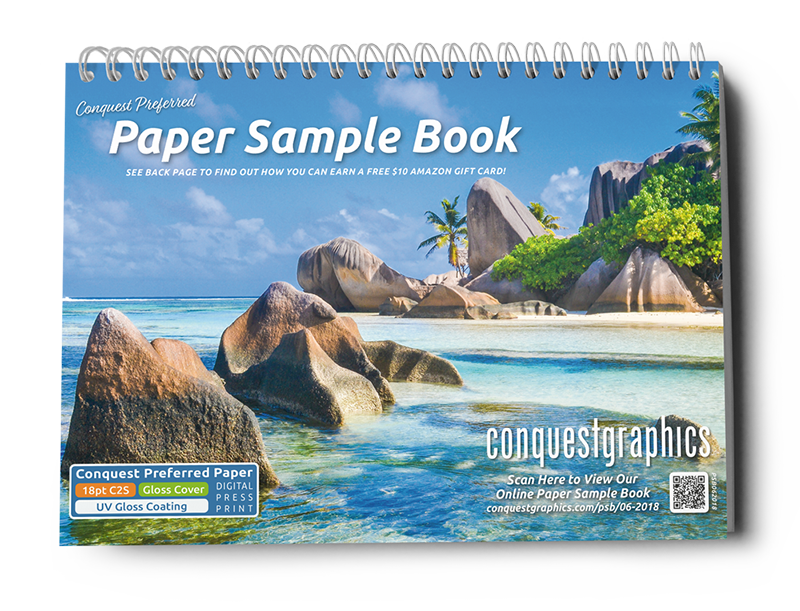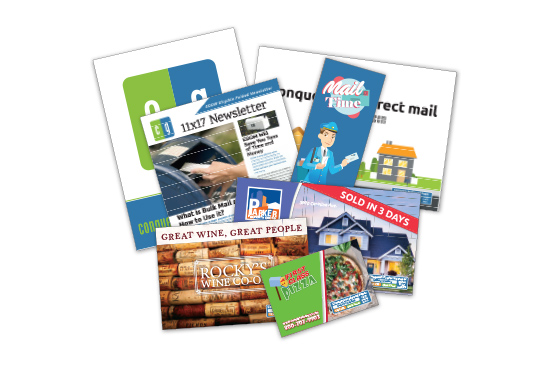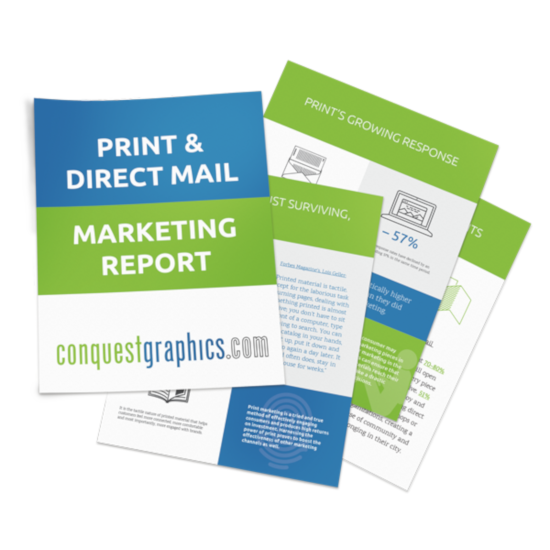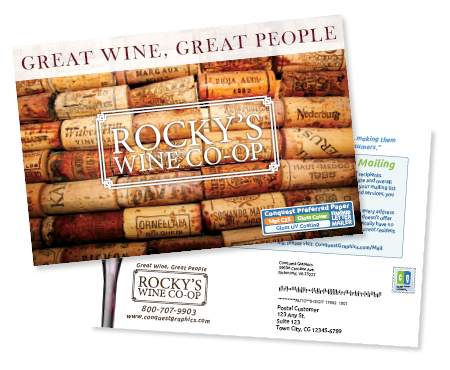If you're a business or non-profit organization that typically accepts freight for your larger shipments, shipping freight is probably the right option if you're ordering a larger amount of print from Conquest Graphics.
But sometimes, depending on the size of your order or the address to which you are shipping your print order, it can actually save you tons of money to ship regular ground. Other options which we'll be adding soon, such as UPS Ground Freight, provide customers with an alternative to regular ground if their order may be slightly larger and still require a pallet.
There is also a certain set of lingo that goes with shipping freight, which may be helpful to freshen up when you're determining which freight option to use when shipping with Conquest Graphics. Determining if you need a "liftgate" or your own "scissor lift" can be tricky if you don't know what those words mean. For that purpose, we've included a brief glossary of terms beneath the infographic to help you in cases when you need a refresher on freight terminology.
As always, we at Conquest Graphics understand you may sometimes have outstanding circumstances that surround your shipment or order of print, so we're here to help. Feel free to call us at +1 (800) 707-9903 or email us at customerservice@conquestgraphics.com if you would like to discuss your order or if you have any questions about our ordering process or shipping options.
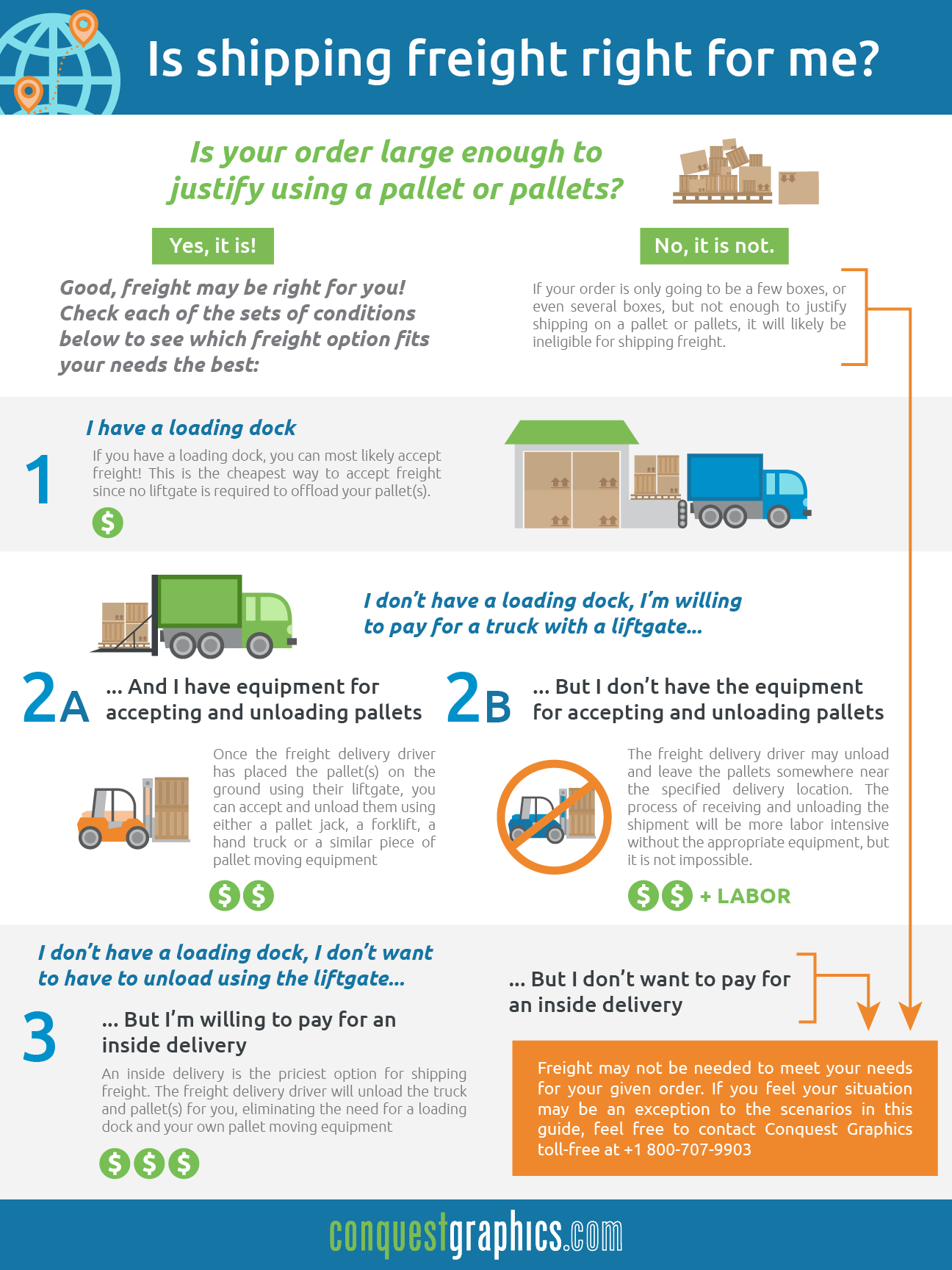
Glossary of Freight and Shipping Terms
-
Inside Pickup and Delivery Service - Pickup or delivery service to locations other than the shipping dock.
-
Less-than-Container-Load (LCL) - When your shipment is less than a full container's load.
-
Full Container Load (FCL) - When your shipment fills an entire container. The most common types of containers are 20′, 40′ and 40′ “High-Cube” containers.
-
Expedite - Rush handling of a shipment.
-
Dock or Loading Dock - A space used for receiving merchandise at a freight terminal.
-
Dock Personnel - Persons hired to load and unload freight from the trailers.
-
Dolly - An auxiliary axle assembly equipped with a fifth wheel (coupling device), for the purpose of converting a semi-trailer into a full-trailer (or for hauling multiple trailers behind a single power unit). The dolly, or converter dolly, is towed by a semi-trailer and supports the front of, and tows, another semi-trailer. Also known as a bogie.
-
Delivery - The act of transferring freight from the carrier to the consignee.
-
Carrier - An individual, partnership or corporation engaged in the business of transporting goods.
-
Bill of Lading (B/L or BOL) - A legal document signed by the shipper and carrier tendering the responsibility of the freight to the carrier. The BOL states pertinent information for the shipment such as the complete address of the shipper and consignee, number of pieces, description, weight and any hazardous material information.
-
Commodity - Goods shipped.
-
Consignee - The designated recipient (customer) of a shipment as indicated on the Bill of Lading.
-
Consignor - Synonym for shipper.
-
Shipper - The person/company that gives the shipment to the carrier for delivery to the consignee; the person/company shipping the freight.
-
Forklift (Tow Motor) - A motorized vehicle used to move freight that can't be handled with a dock cart.
-
Forklift Extensions - Longer blades that are attached to the regular blades of the forklift to enable it to move odd-shaped freight and long pallets.
-
Lift Gate (LGATE) - A power-operated tailgate capable of lifting a load from street level to the level of a truck or trailer floor or vice versa.
-
Less-than-Container-Load (LCL) - When your shipment will not fill an entire freight container.
-
Exclusive Use - Full use of a carrier’s trailer by one customer. No other customer’s freight is allowed on the trailer.
-
Full Container Load (FCL) - When your shipment will fill an entire container. The most common types of containers are 20′, 40′ and 40′ “High-Cube” containers.
For more details about freight terminology, visit our source: Estes Express Lines
